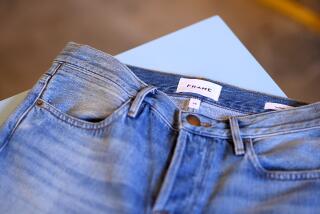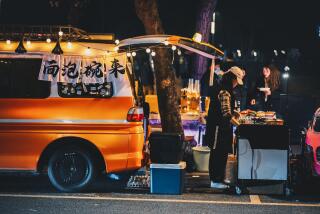Hong Kong Jet Set Hits Turbulence
- Share via
HONG KONG — Proof of Hong Kong’s depressed mood these days was displayed in the gloomy collections presented by young designers at the recent semiannual fashion show here.
One designer, Joseph Li, said his dark, spare creations were inspired by America’s Great Depression. Another, Kaming Ng, sent one of his male models down the runway wearing a dark suit slashed open in the back, symbolizing “tough times.”
“My collection was basically about chaos,” said Ng, who shares a small boutique and studio on the Kowloon peninsula with another designer. “The economy, society, sexuality--everything just seemed so messed up.”
Other signs of the economic doldrums: Upscale shopping malls that once surged with eager customers now stand mostly deserted, festooned with gaudy close-out sale offers. Trendy restaurants in Lan Kwai Fong, the after-hours playground for the territory’s swashbuckling stockbrokers and mutual-fund managers, almost always have empty tables--no reservations needed. “To Let” signs blanket the windows of prime Central District properties.
All these things tell the same story: Hong Kong, Asia’s golden trading capital and gateway to China, is in the throes of its first deep recession since World War II. Earlier this month, the government’s chief economist finally made it official, projecting a 4% decline in the territory’s economy by year’s end. Hong Kong, which in recent years emerged as the world’s most expensive city, a haven for high rollers everywhere, is suddenly slipping.
To be sure, Hong Kong in recession is still the envy of the shattered economies in Indonesia, Malaysia, South Korea and other Asian countries. The special administrative region of China still enjoys a huge currency reserve, somewhere between $90 billion and $100 billion. Unemployment, although at its highest level in years, is still only 5%, just slightly higher than that of the still-vibrant U.S. economy. International trade, reflecting Hong Kong’s leading role as an entrepot for mainland Chinese goods bound for Europe and North America, remains strong despite depreciating currencies in the rest of Asia.
But Hong Kong had been up for so long--enjoying 50 years of uninterrupted growth--that most of the 6.6 million people here have been accustomed to a near-permanent state of well-being.
Of course, the consequences of the recession hit hardest, as they always do, in the ranks of middle-class and poorer residents suddenly faced with unemployment and, recently, pay cuts.
Reality of Asian Crisis Hits Home
For Hong Kong’s rich, who, to paraphrase Hemingway’s famous rejoinder to Fitzgerald, always seemed to have more money than anyone else, the recession has been a different kind of blow, a sudden realization that they are not immune to the problems of the rest of Asia.
So when the economic difficulties hit this year after Hong Kong caught a dose of the general Asian malaise, dropping the value of stocks and property by more than 50%, it upset what Spencer Lam, sales manager of the local Rolls-Royce and Bentley dealership, called the “Hong Kong buying mood.”
The Rolls-Bentley business is a case in point.
Although small, congested and totally unsuited for gracious motor touring, Hong Kong for years has led the world in per capita sales of Rolls-Royces and Bentleys. More than 1,500 of the British-made luxury cars, which, if one counts the 60% import tax on new models, retail for between $300,000 and $500,000 here, are registered to drive the narrow Hong Kong streets. The annual Rolls-Royce owners banquet is a big social event.
Last year, when Hong Kong was still roaring economically and was politically giddy over the successful shift from British to Chinese sovereignty, Lam’s MD Motors sold a record 63 new Rolls-Royces and Bentleys. This year, Lam said, the dealership will be lucky to sell half that number, although the dealership has not gone a month without selling at least one car.
“Our customers are mostly very wealthy people,” Lam said. “Even with their assets reduced by the recession, they still have enough money. But their buying mood is just not good these days.”
Restaurant owners tell a similar tale. Many, such as Patrick Yuen, chairman of the Sun Tung Lok group of restaurants--which specializes in expensive shark’s fin and swallow’s nest dishes--said the first big blow to his business came when Japanese and Southeast Asian tourists stopped coming to Hong Kong because of the Asian financial crisis.
That alone, Yuen said, sitting at a table set with Wedgwood china in his flagship restaurant in Kowloon, cut 30% to 40% of his business. “We totally lost them,” Yuen said.
Then, he added, many of his regular Hong Kong customers began to be more discriminating in what they ordered, shying away from specialty dishes such as “Braised Swallow’s Nest with Crab Roe” that cost $190 a serving or “Sliced Fresh Abalone with Goose Webs” that is on the menu for $80.
Moreover, Yuen said, pointing to a giant flat-screen television on one wall displaying Hong Kong’s Hang Seng index, the customers have become more fickle depending on their fortunes of the day.
“If the Hang Seng index is up, the people will come,” Yuen said. “If the stock market is down, even if they have reservations, they will not always show up. Or if they have reservations for 12 people, only six will show up.”
All of this is a far cry from the boom days of a year ago, when the stock market was at an all-time high here and few people even bothered to look at the price tags of what they were ordering or buying.
Allan Zeman, a Canadian entrepreneur who owns 17 restaurants in the Lan Kwai Fong neighborhood, remembers the evenings when brokers would descend on his California Restaurant in herds, 20 at a time:
“They would start ordering champagne, and on a good day, they’d be spending 2,000 to 3,000 U.S. dollars each just for nothing . . . just for a few hours and maybe a few cigars.
“What is happening in this environment,” said Zeman, who also owns a clothing export business, a yacht-building firm and a fledgling Hollywood film production company (Sweetpea Entertainment), among other interests, “is that people are still ordering wine and champagne, but maybe not the top brands. It’s not flowing the way it did. The lavish dinner parties are not being given the way they were.”
Hamish Cruden, a stockbroker with the Hong Kong firm Salisbury Securities, nursed his drink at the California Restaurant on a recent evening and said his income had dropped 90% since the stock market crash last spring. But Cruden, who described his income as still substantial, said the real losers in the Hong Kong recession are the small-time investors.
“By and large,” Cruden said, “the people on the street lost all of their disposable income. They used to spend their whole day looking at their beeper and watching stock prices. They had big debt and bought on the margin. Now they have nothing.”
Charity Balls Suffer; Fewer Trips to Paris
Some of the indicators of Hong Kong’s economic downturn would appear laughable in most other settings. For example, the so-called collapse in the territory’s real estate market means that luxury apartments in the swankier neighborhoods that last year rented for $15,000 a month can now be had for $10,000 a month.
Tables for 10 at the territory’s famous charity balls, Hong Kong high society’s most important social events, used to be routinely auctioned for more than $10,000. Now, charity organizers say, they have trouble getting $5,000 a table.
“Fund-raisers are finding it a lot harder to raise money,” said Chin Huat Ong, society editor of the South China Morning Post newspaper. “Even among the super-rich there is definitely a lot of belt-tightening going on. Money is not flowing as freely as before. People who used to go to Paris four times a year now go only twice.”
One of the main indexes of Hong Kong prosperity is gambling, both at the casinos in nearby Macao and at the two Hong Kong thoroughbred courses, Happy Valley and Shatin. In Asia, gambling is not only a loser’s manic dream of hitting the jackpot but also a winner’s pastime. Betting huge sums here is another way of demonstrating one’s prosperity.
Given the tight economic situation, stewards of the exclusive Hong Kong Jockey Club, which operates the two horse-racing tracks, were understandably worried about falling fortunes when the season opened earlier this month. The track income also is important to the government, which gets 10% of its tax revenues from track receipts, more than from any other single source.
To get this season off to an auspicious start, the Jockey Club ceremoniously offered roast pigs to the god of wealth before the openings of both tracks. To ensure good attendance at Shatin, management hired Cantonese pop idol Andy Lau to appear. Reflecting their hopeful sentiments, Lau performed a tune called “The Good Days.”
The results were mixed. Attendance was up over last year, but betting was slightly down.
Fashion Designer Says He’s Skirting Slump
Barney Cheng, one of Hong Kong’s most celebrated fashion designers, is a cheerful, energetic man who has his own measure of the territory’s financial well-being. Cheng said two factors have spared his company, Yenrabi Ltd., most of the misery of the recession.
“First,” Cheng said, “I have to thank my lucky stars because this year in the lunar calendar is an auspicious year for getting married and having children. Most of my orders have been related to that.”
Second, Cheng’s hip and retro designs featuring Western and traditional Chinese themes have taken off overseas, where they are offered in the ready-to-wear sections of such stores as Neiman Marcus, Bergdorf Goodman, Saks and Giorgio in Beverly Hills. He also continues to have customers such as Michele Ong Cheung, a custom jeweler who came in recently to be fitted for a mink-lined raincoat.
“I’m going to Europe in November,” Cheung explained, “and sometimes it drizzles a little.” She said she would pay about $6,000 for the raincoat.
But the charity-ball gown trade, which used to be his mainstay, has fallen off badly in a way he says reflects the true state of the Hong Kong economy.
Before the recession, Hong Kong society figures usually bought their formal evening wear in Paris or Milan--which required at least four trips a year to Europe for shows or fittings--or, if they wanted an element of traditional Chinese design, from top local designers such as Cheng.
“Before this year,” Cheng said, “my clients would say: ‘OK, this year I have 40 balls to go to. I’ll need 20 [of the gowns from you].’ ” This is no small matter--Cheng charges an average of $6,000 for a hand-sewn gown.
“Basically, they would just give me carte blanche, and they just send their social secretary over to pay for it. Whereas today, they are not going to so many balls, and they are being much more picky about it. So they whittle it down to about 10 gowns. Sometimes, they even bring in their old gowns, and we modify them for them.
“And sometimes,” Cheng added in a conspiratorial whisper, “they even wear the same gown twice.”
More to Read
Sign up for Essential California
The most important California stories and recommendations in your inbox every morning.
You may occasionally receive promotional content from the Los Angeles Times.













